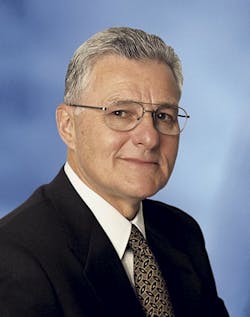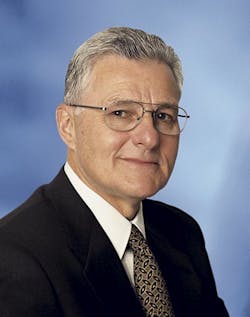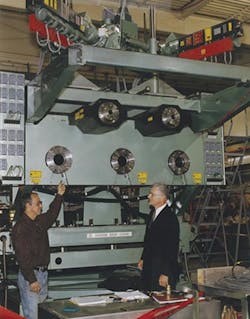Farming sets path for success
From a potato farm in Connecticut, Robert Ackley rose to president of a global plastic and rubber extrusion equipment company. He spent his entire 46-year plastics career at Davis-Standard, nearly half of that time as the company's president. During that time, the company grew from a single factory to a global force and increased sales by more than $300 million. Ackley was chairman of SPI (now Plastics Industry Association) for two terms and director of the American Society of Mechanical Engineers. In May, he will be inducted into the Plastics Hall of Fame.
Ackley discussed his career with PMM correspondent Lisa Jo Lupo.
Just the facts
WHO IS HE: Robert (Bob) Ackley, 22-year president of Davis-Standard, retired in 2005HEADQUARTERS: Pawcatuck, Conn.COMPANY FOCUS: Davis-Standard designs and manufactures extrusion and processing systems for the plastics and rubber industries.
You started at Davis-Standard right out of high school. Why Davis-Standard? Why the plastics industry?Ackley: I was brought up on a potato farm, but my father was working on getting out of the farming business at that time because automated machinery was not going to work too well in Connecticut's stony, rocky soil. So, after high school, I went door-to-door looking for a job. I was still 17 years old, and was particularly good at drafting in school, so one of the doors I knocked on was Davis-Standard — and I started work the next day as a draftsman.
To what do you credit your rise from draftsman to president?Ackley: At the time I started, we were in an old factory with dust coming in the open windows onto your drawing board. But I enjoyed it and worked hard. Having come from the farming life, I didn't think of anything else as hard work. I was always an early bird; I made sure I put in my full time every day — and then some. Then the company came out with a program where I could go to night school. So, I went — for about 20 years because I only took one or two classes at a time — and got an engineering degree. Then I went to University of New Haven and got my MBA while I was working and my wife Elaine was raising our three children.
You worked in or managed nearly every aspect of the business while at Davis-Standard. How do you think that experience benefited you?Ackley: I had lots of different jobs in the company — as a draftsman, designer, design engineer. Then, I became the head of mechanical engineering, then head of electrical and mechanical engineering, then I had R&D and engineering. After that, I managed the field service department, then became head of the wire and cable product group, then was put in charge of sales — and engineering, and R&D. From all this, I learned the company and what we did, and it gave me customer experience and field experience, which is one of the best jobs anyone can ever have to learn about a business.
You then became president in 1983 and made some significant contributions. Tell us about that.Ackley: Well, when the president of the company, Bill Preston, decided to retire, he called me in and said, "I'm retiring and you're going to be the new president." When I took over as president, the company had sales of about $20 million, with wire and cable as a big factor. When I retired, sales were nearly $350 million, and we were in multiple product lines. About half of it was organic growth — we kept improving what we were doing internally — and about half was acquisitions. In that process, we went from one factory in Connecticut to factories in New Jersey, New York, Germany, England, France for a brief period, and we started doing business off-shore in China. So, we pretty much sold globally on the product lines we had.
To what would you attribute that organic growth?Ackley: I think it was taking a look at what we were really good at and saying, "Who else is good at that? Who is the competition? And how do we shape up to them?" We started off with extruders at which we really are good, and we have a pretty good market share, so we made an all-out effort to promote extruders. We came out with a new product line, a high-tech line, and a low-cost "blue ribbon" line, and we started developing pretty advanced electronic controls. We were fairly early in that, so I bought a controls business just to get people and got a jump on that.
Were you personally involved with the development or innovation of any machinery or equipment at Davis-Standard?Ackley: I have one patent for a self-aligning seal tip in wire and cable that allowed the extruder to expand in one direction and the continuous processing of vulcanizing tubes in another direction without causing damage to the extrusion head. It's still used, although I'm sure the patent has run out.
What do you see as the company's greatest contributions to the extrusion industry while you were president?Ackley: The industry contributed to us by allowing our growth to be pretty quick. How did we contribute to the industry? Well, some advanced customers tend to always be looking at how they can do it a little better or different, and we were quite willing to work with them. We had a good laboratory with extruders; our customers would come in and use them, and we would help them advance what they were doing. And, of course, that always helped us, as well, if they were successful. I think we always tried to put a good emphasis on the customer, because if he's successful and we can help him be successful, we will be successful.
You have been commended for your team and motivational approach to leadership. What is your leadership philosophy?Ackley: I have always believed that hard work is good for you; I got that from my farm life and my father. And I wouldn't usually ask anyone to do anything that required more work than I would do. I tried to treat people fair and work with them, as well as having them work for me and give them the tools they needed to be successful.I would make a daily walk through the shop when I was in town and would be happy to talk with the guy assembling a machine, the guy running a milling machine cutting a screw. I did that often and regularly, so I knew all the people, to the degree you can; in the other locations it didn't happen quite so much. I didn't believe in the corner office separate from all the rest, that's for sure.I'm really pleased that after all these years and the company being bought out and moved around, the president is Jim Murphy — who I had on a list of people who should succeed me about 25 years ago — and a lot of the same people are still there. So, I think having the right people in the right place is pretty important. They don't all have to be like me or like each other — and I think that is also important. You have to recognize that good people don't have a particular format that they operate under. I think being able to live with their differences is very helpful in being successful.
You've held key positions in industry associations. Why is involvement important?Ackley: I think it's important to be in touch with other people in the industry, and get to know people in other parts of plastics, like the chemical side, so you stay in touch with what is going on and you protect the industry from things that are going on that maybe shouldn't. Laws and regulations for the plastic industry didn't always go in the right direction or could have gone in the wrong direction. So, I think it's good to be involved, and it's important to contribute.
What does it mean to you to be inducted into the Plastics Hall of Fame?Ackley: It's quite an honor to be inducted into that group of people that I've always looked up to as somebody who has really accomplished something. It's also an honor to be selected by people I work with, to get my name in to be nominated.
What do you see as your greatest contribution to the industry? What would you like to be your legacy?Ackley: I think we created the world's foremost plastic extruder company. I was certainly a big part of that. Personally, that I was successful, I moved up the chain, worked with some great people, and got to travel the world on business and meet people all over that world. That's a wonderful thing to do.


